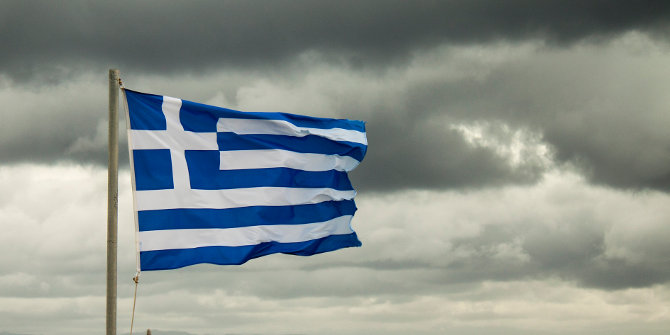 Although much of the attention concerning the migration crisis has recently focused on Greece and Turkey, dangerous boat crossings from Libya continue to present a significant problem. Simon McMahon writes on a proposal by David Cameron to intercept boats in the Mediterranean and return them to the Libyan shore. He argues that the proposal could prove extremely dangerous in practice, noting that previous attempts to implement such a policy in Libya in 2009 created more problems than they solved.
Although much of the attention concerning the migration crisis has recently focused on Greece and Turkey, dangerous boat crossings from Libya continue to present a significant problem. Simon McMahon writes on a proposal by David Cameron to intercept boats in the Mediterranean and return them to the Libyan shore. He argues that the proposal could prove extremely dangerous in practice, noting that previous attempts to implement such a policy in Libya in 2009 created more problems than they solved.
As the European Union invests increasing energy in controlling the movement of refugees from Turkey to Greece, the attention of political leaders and the press seems to have moved away from the other sea crossing to Europe, through the Central Mediterranean to Italy.
David Cameron has been one of the few to buck this trend, with the British Prime Minister recently calling for an increased naval presence in the region and stating that boats smuggling people should be turned back to the Libyan shore for destruction. But by advocating pushbacks to Libya, the UK Government is engaging in decidedly wishful thinking about the security situation in the country. It is also acting on false assumptions about the dynamics of migration. The proposal as it stands is highly dangerous and fails to learn from past experiences.
A flawed model for addressing migration
Back in October 2014, the British Foreign Office stated that it would not be involved in rescue operations for migrants in the Central Mediterranean area, considering that these acted as a ‘pull factor’ encouraging more people to make the dangerous journey. But since then people have continued to attempt the crossing, with over 153,000 arriving in Italy in 2015 and nearly 3,000 deaths recorded in the same stretch of sea.

More recent efforts to stop people from coming to Europe have concentrated on ‘breaking the business model’ of smuggling networks. In particular, in June 2015 the EU launched the EUNAVFOR MED mission in the Southern Central Mediterranean – phase one of which focused on surveillance of smuggling networks in the region. In October this moved into phase two: searching for and diverting ‘suspicious vessels’ in international waters. Phase three would involve action in Libyan territory to ‘dispose of vessels and related assets’ before use.
Worryingly, a UK Government source is reported to have stated that the mission can already be further extended because it has ‘achieved a lot in terms of bringing the numbers down’. There is no evidence for this. In fact, the number of people arriving by boat in Italy was higher for the first 3 months of 2016 than the same period in 2015.
Pushing migrants back to Libya is a dangerous strategy and it is unlikely to deter them from making the journey because it fails to address the situation that they are trying to escape. As part of the MEDMIG research project I have been interviewing people who made the journey to Italy across the Mediterranean in 2015. Most of them came through Libya and they describe a country in chaos, where violence and kidnappings are commonplace. Even the newly-formed and UN-backed Libyan government thinks it isn’t safe enough to physically be there – they are currently based in Tunisia.
For many of the people I met, getting on a boat was the only way to get out of Libya; going back was not seen as an option. Elsewhere, the threat of dying in the country’s borderlands with Niger, Chad, Egypt and Sudan has been widely reported. Pushing people back at sea would be contrary to international law, which states that no one shall expel or return a refugee against his or her will, in any manner whatsoever, to a territory where he or she fears threats to life or freedom.
Ignoring the past
This isn’t the first time that pushbacks to Libya have been proposed as a way of stopping migration across the Mediterranean. It is estimated that more than 1,000 migrants were intercepted and forcibly returned to Libya by the Italian coastguard in 2009 as part of a multi-billion euro agreement signed with the Gaddafi government in 2008, which had ‘the fight against illegal immigration and organised crime that manages human trafficking’ as a primary objective. This involved towing boats back to Libyan waters, rescuing people in distress and taking them back to Libyan ports, or stopping migrants’ boats and handing them over to the Libyan forces at sea.
Italy’s pushbacks were roundly discredited as a legitimate way to manage migration. In the Italian parliament it was stated that ‘in all cases of pushbacks that have taken place from May 2009 to the end of October, there has been no process of identification of the migrants nor a review of their health nor verification of the requirements for being granted international protection’. Then, in 2012, the European Court of Human Rights declared Italy’s pushbacks to be unlawful. The court found that Somali and Eritrean nationals who had been rescued at sea by the Italian Coastguard and taken back to Tripoli had their right to seek political asylum violated and were exposed to potential torture and degrading treatment in detention camps in Libya, or to expulsion back to home countries where they risked further persecution.
Looking forward
As the Italian experience shows, pushbacks are highly problematic. It is difficult, if not impossible, to provide appropriate protection for those making the journey whilst they are still at sea and to ensure that their lives are not at risk in the place they are taken back to. Italy’s pushbacks took place before the Arab Spring and the eruption of conflict in Libya. It is unlikely that Libya is a safer place to turn people back to today than it was then. So why is the UK Government suggesting that pushbacks should be renewed?
David Cameron has said that he wants to break the link between getting in a boat and settling in Europe. But this principle should not come at the expense of an understanding of the situations that people are living in before making the journey.
Please read our comments policy before commenting.
Note: This article gives the views of the author, and not the position of EUROPP – European Politics and Policy, nor of the London School of Economics.
Shortened URL for this post: http://bit.ly/1Tk7tXC
_________________________________
 Simon McMahon – Coventry University
Simon McMahon – Coventry University
Simon McMahon is a Research Fellow at Coventry University.






An amazingly limited analysis.
You make no mention of Australia’s Operation Sovereign Borders which based its boat turnback policy on information provided by captured people smugglers that such a policy would indeed put them out of business.
Which it has.
Zero boats and zero deaths in Two Years!
Why do you ignore this, the only other legal alternative to the EU debacle that has mercilessly killed well over 20,000 victims?
I cannot understand this approach by any tertiary institution.
For the information of others. Australia has an extensive immigration and refugee program.
The Australian Electorate had the endearing characteristic of blaming its politicians for the deaths at sea caused by people smugglers.
3 Elections have largely been decided on by border policies.
The policy now favoured by both the Government and the Labor Party is to deny destination choice of any customer of a people smuggler who attempts to arrive by boat.
The policy revolves around Offshore Processing where 3rd World Neighbours are paid to process irregular arrivals.
Whilst at sea, boat turnarounds are conducted along with Navy supplied alternative boats which safely transport people smuggler customers back to Indonesia where everyone is SAFE!
This writer suggested the famous lifeboat strategy some six months prior to the Royal Australian Navy doing it.
It has been amazingly successful.
Cambodia, another tourist destination for Australia was contracted by Australia to offer asylum to any UNHCR determined genuine refugee processed offshore.
Of the thousands offered asylum, most have gone home once realising Australia, their target country, was truly off the agenda.
Of the thousands of UNHCR Genuine Refugees offered asylum – only 5 – that’s FIVE accepted the offer.
3 subsequently went back home.
Thus leading many to observing that the overriding motivation for people smuggler customers to Australia was indeed a lifestyle or economic choice.
Simply put, the UNHCR determination process is bogus, not producing genuine refugees but providing the means for crossing the borders of other nations with a fig leaf of legitimacy.
Further to the above, General Jim Molan who was brought to the job of beating the smugglers by Australia’s then Prime Minister Mr Tony Abbott, was also engaged by EU governments to give advice.
He states without an ounce of rancour that he quickly realised that Europe’s response was doomed by the fatal flaw involved with national governments giving over responsibility for their borders to the EU who were then unwilling to exercise responsibility.
This is a recent interview of the good General.
Remember when you are watching this you are watching a man who has saved thousands of lives.
Thousands of Alan Kurdis who haven’t been killed because of his clear thinking and willingness to take responsibility.
https://www.youtube.com/embed/SllSg_RdcZI
The intent of this article has numerous logical and legal flaws. Regardless, instead of discussing the counterarguments to migration, my reply will be limited to the articles’ motive of actively allowing (or even actively promoting) a mass migration into Europe, instead of discussing how to limit migration (or more accurately, limit the invasion into Europe). [See recent BBC article regarding the University of New South Wales referring to a past mass migration as an “invasion”: http://www.bbc.com/news/world-australia-35922858 ). This LSE articles’ focus is that because current efforts to limit migration are unsuccessful in Europe, that Europe might as well surrender on those efforts, instead of seeking a better solution. (The “I quit” philosophy is not one that most people find compelling). Perhaps this article should also discuss the Australian solution to preventing a new invasion.
In response to the Migration Crisis that the European Union now faces on its southern borders the political and academic policymakers need to realise that the continent of Europe can not become the place of residence for large numbers of Middle Eastern descended migrants because fundamentally Europe is full.
The UK is fast becoming the most overcrowded country in the European Union and further inflows of migration from the Middle East can not become the normative occurrence. Yes there are humanitarian reasons why people are leaving the Middle East but the countries that caused the problems in the first place in this I refer to Saudi Arabia, Qatar and Turkey those countries who have aided and abetted the rise of the Islamic State Insurgency in the first place.
The UK has become home to far too many people already and there is not the natural capacity to absorb further large scale numbers of migrants.
It might come as a shock to the system to many but the problems in the Middle East will not be solved if large numbers of people simply scuttle and run from their obligation to fight for their country’s freedom against ISIS and the Assad regime.
The conduct of these Migrants once in Europe is a serious threat to law and order the violence perpetrated by them in Europe is widely documented by independent press sources and the behaviour of the younger male migrants in Germany is something to be stopped.
There were no problems with Zimbabwean Refugees who fled Robert Mugabe and his tyranny they came to the UK and were better behaved. They were in no less danger than those from Syria and Libya.
The UK and The EU should state 100% No More Refugees from the Middle East we have taken enough already.
I don’t agree with a single word.
The flow of migrants through Turkey has all but stopped – why? Because the migrants know it is no longer a viable route.
The same thing would obviously happen with the Libyan route if it is made clear to the migrants attempting the journey that there is no hope of success. Migrants who have tried but failed to make it would return home and word would spread that it is no longer possible.
As for the suggestion that it would be a breach of migrants’ human rights to return them to Libya, this is ridiculous as almost none of the migrants are Libyan. Most of them are economic migrants from Somalia or West Africa. They put themselves into this dangerous position by travelling to Libya in the first place. It is nonsensical to say that they cannot be returned to a place they voluntarily entered. It is also absurd from a public policy perspective as it allows economic migrants to take advantage of laws designed to protect people genuinely suffering from persecution and leaves nation states powerless to control their own borders. Finally, it is entirely self-defeating as it encourages more people to put themselves in danger.
Europe is under no moral or legal obligation to house all of the world’s poor and needy. Most migrants attempting the journey will have come from extremely difficult circumstances but it is not in the interests of Europe or the rest of the world to allow them all to migrate to Europe. Less economically developed countries should instead be assisted in improving their own conditions to the greatest extent possible.
The logic fallacy is that something that “lets” thousands of unwanted people to come to a place as “illegal” to turn them back!
Invasion is a fact of modern-day warfare and the efforts of people to leave Africa to destroy Europe is well-known. Nobody in their right mind can say this is a “lawful” gathering of people.
The richest nations in the world (or possibly second?) Saudi Arabia, with its’ satellites is Islamic and should accommodate these lost souls. Obviously it is a planned invasion of Europe for a future “Jihad” which makes it a war.
The people who support the “Welcome” movement have a certain “suspension of disbelief” in that it requires completely ignoring human history being that of continual invasion and conquest, and their premise is one that believes all people are good and honest. Perhaps they also believe that the native American tribes voluntarily gave their lands and minerals and women to the European invaders (as did the native Hawaiians and as did the native aborigines), and they lived together in peace with the invaders. (Under the current legal definition, the Europeans fleeing Europe would be considered “political refugees”; will history repeat itself).
So the question, who is more naive: those politicians who support the “Welcome” mentality, or, those who elect the politicians who support the “Welcome” movement?
Wake up!